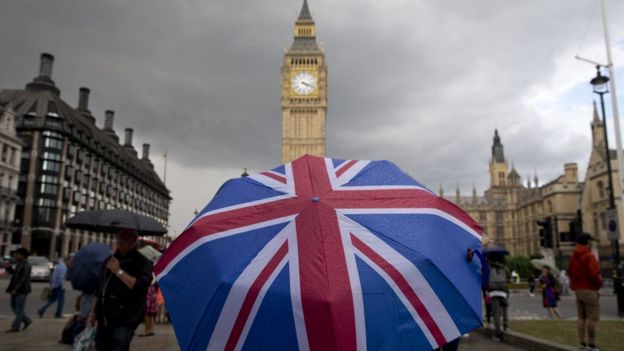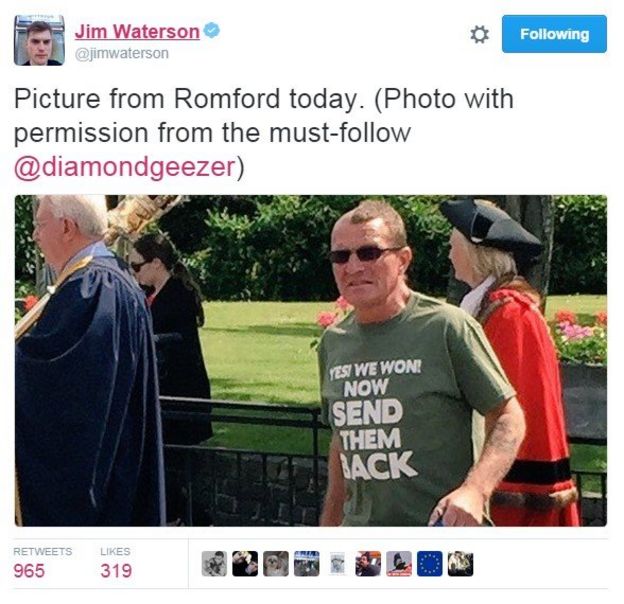
When is the UK leaving? Why hasn't it left already?
For the UK to leave the EU, it has to formally invoke an agreement called Article 50 of the Lisbon Treaty. No country has ever left the EU, so Article 50 is untested.
Once Article 50 has been invoked in a letter or a speech, the formal process of withdrawing from the EU can begin, at which point the UK has two years to negotiate its withdrawal with the other member states.
In his statement after the results of the referendum, UK Prime Minister David Cameron - who backed Remain - said he would resign in October and leave it to his successor to decide when to trigger Article 50.
Leave campaigners say they want informal discussions with the EU first, but the foreign ministers of France and Germany have called for Article 50 to be triggered as soon as possible to avoid prolonging a period of uncertainty.
Could Brexit break up the UK?
Unlike England and Wales, Scotland voted overwhelmingly to remain in the EU, and Scotland's First Minister Nicola Sturgeon says it is "democratically unacceptable" for the country to be taken out of the union against its will.
A second independence referendum for the country is now "highly likely", she says, and recent polls suggest roughly 60% of Scots are now in favor of leaving the UK in order to remain in the EU.
One constitutional expert has suggested Scotland could go further under its law and effectively veto Brexit, although others have dismissed this idea as extreme.
Northern Ireland also voted in favour of remain, and Deputy First Minister Martin McGuinness, of the Sinn Fein party, has called for a referendum on reuniting the North
with the South, which is outside the UK and remains in the EU.
But the Westminster-based Northern Ireland Secretary Theresa Villiers has ruled out the call for a vote, saying there was no legal framework for it to be called.
There is uncertainty over whether a so-called "hard border" would have to be put in place between the North and the South if the North exits the EU.
Is the Leave campaign abandoning its pledges?

Within hours of the results, the Leave campaign was being accused of rowing back on several of its key campaign pledges. Among them, the bold claim that the UK would take back £350m donated to the EU every week . The pledge was widely criticized during the campaign by many who pointed out that £350m is the UK's gross contribution, and that it receives vast sums of money back from the EU.
Other key campaign pledges have been called into question. Leave promised to "take back control of Britain's borders" and reduce immigration, but several key Leave campaigners have since suggested that the UK may need to accept freedom of movement in order to have access to the single European market."A lot of things were said in advance of this referendum that we might want to think about again," said Leave campaigner and former Conservative minister Liam Fox.
Is UK politics falling apart?

The days since the vote have produced scenes of political upheaval unprecedented in recent political history, with both the government and the opposition in turmoil. "A country renowned for its political and legal stability is descending into chaos," wrote the New York Times on Monday.
On Friday morning, the prime minister announced his resignation, just over a year into his second term, telling the country he would stay on until October to smooth the transition.
The Conservative party now has to find a new leader but it has been fiercely divided by the referendum. The front-runner is former London mayor Boris Johnson, who led the Leave campaign. Other key contenders include Home Secretary Theresa May and Chancellor George Osborne, but both were on the losing side of the Brexit vote.
This would normally play into the hands of the Labor party, the main opposition, but Labor too finds itself in crisis. Waves of the party's shadow cabinet have resigned in the wake of the referendum, ahead of an expected vote of no-confidence in leader Jeremy Corbyn.
Many Labor MPs believe Mr Corbyn failed to mobilize Labor voters to support the Remain campaign and would fail to win a snap general election in the likely event one were to be called later this year.
If the motion of no-confidence is successful there will be a vote for a new Labour leader. There is disagreement within the party about whether Mr Corbyn would automatically be entitled to a place on the ballot.
Has the Leave campaign encouraged racism?
There are no official statistics, but there has been a significant number of reports on social media of racist abuse linked to the Leave win. Some high-profile incidents have been verified by police.
In Hammersmith, west London, on Sunday, suspected racist graffiti was painted on the front entrance of the Polish Social and Cultural Association.
And in Cambridgeshire, police are investigating laminated cards that were posted through letterboxes and left outside a school, which read: "Leave the EU/No more Polish vermin" in both English and Polish.
There has been a stream of reports on social media of people hurling abuse at others they assume to be immigrants. The Leave campaign has faced accusations that it encouraged hostility towards immigrants

What happens to immigrants already in the UK?
EU immigrants already in the UK would probably be granted indefinite leave to remain, as the Leave campaign has not called for them to be deported, but there are no guarantees at this stage.
Under current EU freedom of movement law, citizens are free to travel and settle in other member states. If the UK negotiates to keep freedom of movement after Brexit, EU immigrants in the UK (about 3 million) and British migrants abroad (about 1.2 million) will be unaffected.
But the UK government may find itself under significant pressure to withdraw from freedom of movement after the Leave campaign pledged to reduce European immigration. This would then probably require UK citizens to obtain a visa to work or live abroad, and the same for EU citizens wanting to settle in the UK. Immigrants from outside of the EU are not affected by the change.
This decision was so wrong. United, Europe is stronger, has more power and clout, a force to be reckoned with. The UK has been defeated by a lot of retirees who want to turn the clock back . Isolation does not work in this new, harsher world. The 'Leave' people are impeding the, already snail's pace, progress toward a united world. The idea is to welcome immigrants and absorb them into our society. Everyone's family, in the western world, originally, came from someplace else. And I believe this decision may mean economic hardship for the UK.
The future lies in being a united planet. To save the world from global warming will take a united effort. Beating ISIS will take a united effort. Defeating crazy dictators with ideas of world domination and nuclear war, will take a united effort. World hunger? ... United effort. Apocalyptic viruses and alien landings...'united we stand'.
As for migrant peoples from Syria and parts of Africa ... they should be accommodated according to the size of the host country. People who have braved the Mediterranean in a rubber raft, in desperation, to escape untold horrors, deserve to be shown some mercy and humanity. We all need to do better regarding that situation.
Opting out is not the solution.
No comments:
Post a Comment
Through this ever open gate
None come too early
None too late
Thanks for dropping in ... the PICs